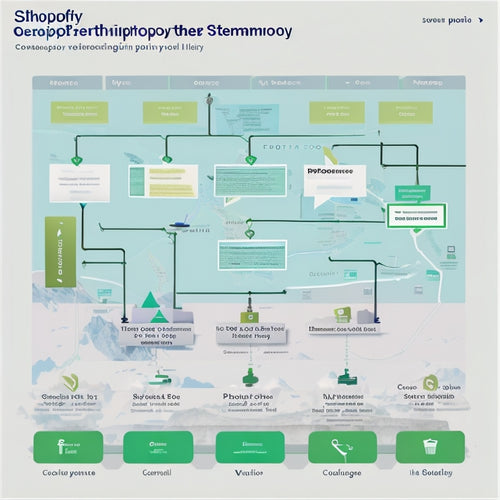
Master the Art of Selling Digital Products
Share
You're about to master the art of selling digital products by building a solid foundation, refining your digital product creation skills, and optimizing your conversion rates. Start by selecting the right e-commerce platform, choosing products with high demand and profit margins, and developing pricing strategies that balance revenue goals with customer affordability. Then, focus on creating a customer-centric experience, implementing targeted promotions, and highlighting your product's unique features. By following these strategies, you'll be well on your way to driving sales, revenue, and growth. Now, take the next step to revealing your full potential.
Key Takeaways
• Develop a customer-centric approach by refining digital product creation skills to meet customer needs and preferences.
• Implement tiered pricing, discounts, or bundle deals to boost sales and increase revenue goals.
• Optimize conversion rates by creating clear and actionable call-to-actions, and enhancing user engagement through interactive experiences.
• Build trust and loyalty with seamless customer experience, providing multiple payment options and encouraging customer feedback.
• Utilize data-driven decisions to optimize store performance, and enhance customer satisfaction through personalized experiences.
Building a Solid Foundation
When setting up your online store, building a solid foundation is essential, and choosing the right e-commerce platform, such as WooCommerce, is the first critical step in creating a successful digital product store.
You'll want to select products that resonate with your target audience, considering factors like demand, competition, and profit margins.
Next, develop pricing strategies that balance revenue goals with customer affordability. Consider offering tiered pricing, discounts, or bundle deals to incentivize sales.
By getting these fundamental elements right, you'll set yourself up for success and create a strong foundation for your digital product store.
With a solid base in place, you can focus on optimizing performance, creating a customer-centric experience, and driving sales.
Digital Product Mastery
With a solid foundation in place, you're now ready to dive deeper into the world of digital products, where mastering the intricacies of selling digital goods can make all the difference between success and stagnation.
To achieve digital product mastery, focus on refining your digital product creation skills, ensuring they meet your customers' needs and stand out in a crowded market.
Develop marketing tactics that drive customer engagement, such as targeted promotions and loyalty programs. Effective product differentiation is key, so highlight what sets your products apart from the competition.
Conversion Rate Optimization
You'll significantly improve your online store's revenue by optimizing your conversion rate, which is the percentage of website visitors who complete a desired action, such as making a purchase or subscribing to a service.
To achieve this, you'll need to implement A/B testing to identify what's working and what's not. Analyze your pricing strategies to find the sweet spot that resonates with your target audience.
A clear and prominent call to action (CTA) is essential to guide visitors towards completing the desired action. Confirm your CTA is concise, visible, and actionable.
Additionally, focus on user engagement by creating an interactive experience that encourages visitors to explore your store. By optimizing these elements, you'll be well on your way to maximizing your conversion rate and boosting revenue.
Customer Experience Matters
Crafting a seamless customer experience is essential to building trust and loyalty with your digital product customers, as it directly impacts their satisfaction and ultimately, your store's revenue.
You can achieve this by providing multiple payment options, making it convenient for customers to complete their purchases. Additionally, you should encourage customer feedback to understand their needs and preferences. This will help you identify areas for improvement and make data-driven decisions to optimize your store's performance.
Selling Strategies and Growth
Develop a tailored marketing strategy that aligns with your target audience's needs and preferences to effectively promote and sell your digital products. Understanding your target audience is pivotal in determining the most effective pricing strategy. Consider factors such as their willingness to pay, perceived value, and competitors' pricing.
| Pricing Strategy | Description | Benefits |
|---|---|---|
| Penetration Pricing | Low initial price to attract customers | Quickly gain market share |
| Skim Pricing | High initial price to maximize profits | High revenue in the short term |
| Bundle Pricing | Offering multiple products at a discounted rate | Increase average order value |
| Freemium Pricing | Basic product is free, premium features require payment | Attract a large user base |
Frequently Asked Questions
How Do I Handle Refunds and Returns for Digital Products?
'A million customers will breathe a sigh of relief if you have a clear refund policy in place! You'll guarantee customer satisfaction by setting expectations, communicating strategies, and having a plan for refunds and returns, making it a seamless process for both you and your customers.'
Can I Sell Licensed or Copyrighted Digital Content?
You must verify you have necessary licenses or permissions to sell copyrighted digital content, avoiding intellectual property infringement and copyright infringement, as selling without permission can lead to legal consequences.
What's the Best Way to Protect Digital Products From Piracy?
"Don't let pirates sink your ship! To protect your digital products, you implement anti-piracy measures like digital rights management, watermarking, and secure downloads, ensuring your valuable content stays safe from prying eyes."
How Do I Deliver Large Digital Files to Customers?
You'll want to explore file sharing solutions, such as Google Drive or Dropbox, and cloud storage options, like Amazon S3, to deliver large digital files to customers securely and efficiently, ensuring timely access without compromising file integrity.
Are There Any Specific Tax Laws for Digital Product Sales?
You need to understand tax implications for digital product sales, as laws vary by country and region. Research international sales restrictions and comply with VAT, GST, and other tax regulations to avoid legal issues and guarantee a secure online business.
Related Posts
-

Optimizing Shopify App Marketing: Strategies for Success
This article focuses on the optimization of Shopify app marketing strategies for achieving success. It provides insi...
-

How Does Shopify Generate a Sitemap
This article examines the process of sitemap generation on the Shopify platform. It explores the benefits of Shopify...
-

Which Is the Best Email Marketing App for Shopify
This article aims to provide an objective analysis of the best email marketing app for Shopify. It will discuss the ...


